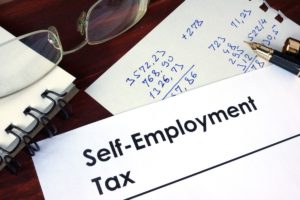When you’re the boss, you’re responsible for all the administration, including paying the taxes. As tax season is upon us, we’re offering up some of the best tax tips for the self-employed that will help streamline the process. Once you get familiar with the basics, paying taxes as a self-employed person is fairly straightforward.
Particularly relevant, the job market in 2020 was a big motivator for many workers to rethink their position in the workforce and consider self-employment that they could do from home. As per the Global Entrepreneurship Monitor (GEM) 2022-2023 report, 31 million Americans started new businesses in 2023. For those facing their first tax season as a self-employed person, these tax tips can clarify what can seem like a complicated topic.
1) Save for Your Self-Employment Tax
 You owe the government more money now that you work for yourself. This is referred to as the Self-Employment Tax, a 15.3% tax that you pay on top of your income tax.
You owe the government more money now that you work for yourself. This is referred to as the Self-Employment Tax, a 15.3% tax that you pay on top of your income tax.
If you previously worked as a traditional W2 employee, you paid half of this toward Medicare and Social Security while your employer paid the other half. Now that you work for yourself, you are responsible for the entire percentage.
You will need another form for your self-employment tax, the Schedule SE. If you’re just starting out as an entrepreneur, you’ll add both a Schedule SE and a Schedule C (business profit and loss) to your federal tax filings.
2) Mark Your Calendar for Estimated Tax
Now that you’re self-employed, you owe taxes four times a year. Mark your calendar for April 15th, June 15th September 15th, and January 15th. At each point, you owe 25% of your estimated income for that tax year (January 15th is the last payment for the previous calendar year).
Your estimated taxes include federal income, self-employment, and state income taxes. Make sure you pay each to the correct party (federal and self-employment to the IRS and state to your state’s revenue service).
If you have been keeping track of your income, you should be able to get a reasonable projection from your first quarter. If, however, your business is seasonal or you make significantly more in the last quarter of the year, make sure you take that into account and consider averaging out the tax payments to avoid an underpayment fee at tax time.
3) Boost Your Bookkeeping
 The simplest way to make sure you have the funds to meet your estimated tax responsibilities is to take a percentage out as if you are Accounts Payable withdrawing from your weekly paycheck. You can either do this for each incoming payment from clients (most accurate) or take it from what you pay yourself.
The simplest way to make sure you have the funds to meet your estimated tax responsibilities is to take a percentage out as if you are Accounts Payable withdrawing from your weekly paycheck. You can either do this for each incoming payment from clients (most accurate) or take it from what you pay yourself.
Bookkeeping is essential to any business, however, it is especially important for entrepreneurs and small business owners. If you have the funds to hire a professional, this may be the best option. If not, set yourself up with software or quality spreadsheet building.
You can even use programs that link to your bank account and automatically withdraw your taxes, vacation pay, sick pay, and retirement funds so you don’t have to think about it. If you have employees, this option can alleviate a lot of financial strain and administrative time.
With retirement funds in mind, make sure you still regularly contribute on your own behalf. Stick to a schedule or set up automatic contributions from your bank account.
4) End of Year Expenditure Planning
Other tax tips for the self-employed include making strategic use of end-of-the-year financial decisions, this can also save you on your taxes. Just before the end of the year is a good time to sell assets or make big expenditures.
Making large purchases for your business at the end of the year allows you to count them as depreciating over the current tax year even though they are brand new. This includes supplies, tools, electronics, office equipment or furniture, software, subscriptions, and more.
5) Deduct When You Can
The last of the tax tips for the self-employed is to maximize your tax return taking advantage of every deduction available to you. Like any other business, you are entitled to reduce your overall income with deductions that are related to your work.
 Home Office
Home Office
If you have a space in your home used exclusively for your business, this may be a deduction. Based on the size of your space, you can prorate your rent or mortgage and home insurance, using that amount as a deduction.
Office Expenses and Utilities
Likewise, you can deduct things used exclusively for this office. This includes prorating some utilities that are used in your office, such as internet and phone bills.
Equipment you purchase to outfit your office can also be deducted. This includes items like office supplies, a new computer, or tools used exclusively for the business.
Mileage
If you drive for your job, your mileage can also be deducted. Make sure to keep track of the driving you do for work and for personal use.
Medical Insurance Premiums
If you pay for your health insurance as a self-employed person (i.e. not on a spouse’s health insurance), you can deduct the premiums.
Of course, this is not an exhaustive list of potential deductions. It can be difficult to determine how many you are eligible for and prorating office space and utilities can also be tricky.
Since it is essential to stay in compliance with tax law and avoid an audit that finds you taking too much, enlisting a tax professional to go over your potential deductions is your best bet for finding them all and taking them accurately.
Professional Tax Services
 You are your own business now, but that does not mean you have to take on every role.
You are your own business now, but that does not mean you have to take on every role.
This is a common mistake small business owners make. When possible, outsource help to fill in some of your skill gaps or to make sure things like taxes comply with the law.
At Stableford Capital, we work with self-employed clients and businesses of all sizes, helping to maximize personal and business tax returns while minimizing headaches. Reach out to us with questions regarding your self-employment taxes and see how we can help you file this year. If you’re filing as a self-employed business owner or have other business tax return questions, contact us online for a complimentary 15-minute consultation or call 480.493.2300.
Updated January 2024 for relevancy.
